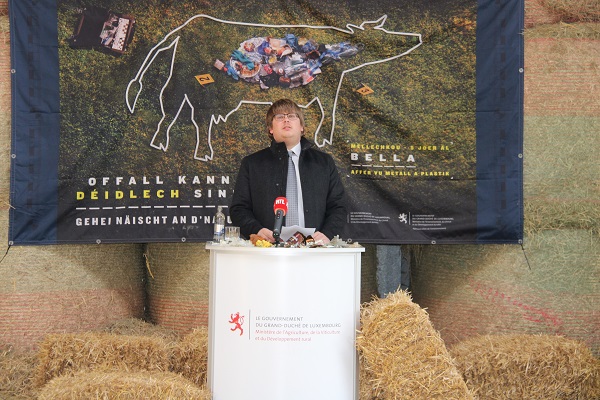 Jeff Schroeder, President of the youth service of the Centrale paysanne luxembourgeoise;
Credit: MA
Jeff Schroeder, President of the youth service of the Centrale paysanne luxembourgeoise;
Credit: MA
Luxembourg's Ministry of Agriculture, Viticulture and Rural Development and Ministry of Environment, Climate and Sustainable Development have announced the re-launch of an anti-littering awareness campaign.
The uncontrolled disposal of rubbish in natural areas is not only a polluting act, but it also causes disease in animals, particularly livestock, which swallow debris in grazing areas.
Faced with this major concern for the agricultural sector, Romain Schneider, Minister of Agriculture, Viticulture and Rural Development, and Carole Dieschbourg, Minister of Environment, Climate and Sustainable Development, today presented the renewal of an anti-littering awareness campaign, which emphasises the danger littering represents for livestock and animal welfare in general.
Agriculture Minister Romain Schneider commented: “As Minister in charge of animal welfare, I recall that each time waste is [disposed of] in nature, it is likely to be ingested by animals and cattle in particular. This year, the problem is all the more acute for farmers as the COVID-19 crisis has generated the craze for nature hikes and the abandonment of waste along the paths and pasture areas. I therefore welcome and support the commitment of the youth service of the Centrale paysanne luxembourgeoise and the Emweltberodung Lëtzebuerg ASBL. Together with the sector, we have joined forces to raise public awareness and fight this scourge!”
Environment Minister Carole Dieschbourg added: “Throwing away cigarette butts, packaging or chewing gum in nature [areas] is not a trivial matter. The impact on the environment is direct and serious”.
At the explicit request of the youth service of the Centrale paysanne luxembourgeoise, the campaign “Offall kann déidlech sinn - gehei näischt an d'Natur” (rubbish can be deadly - don't litter), presented for the first time in spring 2019 and renewed in 2020, has been specially adjusted to the needs of farmers. This year, since the arrival of the spring season, more than 300 signs have been put up by farmers in pasture fields, along roads and footpaths. The message "Däin Offall mécht mech doudkrank - gehei näischt an d'Natur" (your garbage makes me deathly ill - don't litter) which accompanies the visuals aims to make the general public reflect and to halt the phenomenon. This variation of messages against littering concerns both the protection of the environment and that of animal welfare.
Every year, tonnes of waste are disposed of along Luxembourg's roads and footpaths. Cigarette butts, empty packaging and chewing gum are among the most abandoned or discarded items. Some of this discarded waste can present a significant danger of injury or infection to grazing animals. Ingestion of plastic or metal objects by livestock can lead to severe gastrointestinal complications and in worst case death.
Another problematic source of littering for stockbreeders is dog faeces. The single-celled parasite Neospora caninum is present in the stools of some canines. In pregnant cows, this parasite can cause a miscarriage at any stage of pregnancy. To date, there is no treatment or vaccine.
The Environment Agency regularly carries out a study on littering in Luxembourg; this study will be repeated at the end of 2021 / mid-2022. The most recent study, carried out in 2015, revealed that an average of 103 kg of waste per km was collected along national roads (89 kg per km in 2008) and an average of 216 kg of waste per km was collected along motorways (309 kg per km in 2008). The cost of cleaning up litter along Luxembourg's roads (at the expense of the Luxembourg state) amounts to around €1.2 million per year. The most common waste was tin cans (18% of the total volume), followed by plastic bottles (15%).
This anti-littering awareness campaign is co-financed by the Ministry of Agriculture, Viticulture and Rural Development and the Ministry of the Environment, Climate and Sustainable Development and implemented in partnership with the youth service of the Centrale paysanne luxembourgeoise and the Emweltberodung Lëtzebuerg ASBL.








